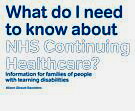 Equipment-funding gap filled by charity.
Equipment-funding gap filled by charity.
One of the most recent children to have benefitted from Newlife stepping in to fill the provision void is three-year-old Ivy Knight from Flitwick in Bedfordshire. Ivy received Newlife's 5,000th equipment grant and has been provided with a £3,600-specialist wheelchair buggy that statutory services refused to fund.
Ivy has cerebral palsy, epilepsy, suffers from more than 20 seizures a day and, after a serious illness in January 2012, has chronic dystonia which causes involuntary movements. Ivy's recent deterioration means she may have a terminal form of the genetic illness Mitochondrial Disorder and so she desperately needed a specialist wheelchair buggy but statutory services wouldn't provide the only chair suitable for her posture.
Dad Lee Knight said: "Four different professionals have said that Ivy needs this equipment but still statutory services refused to fund it. Those who manage the budgets are not aware of the complex requirements of the equipment needed so they allocate insufficient funds that can only purchase poor quality and inadequate items. Although the wheelchair that Ivy needs is more expensive than statutory services will agree to fund, it is a high quality product that can last her into her adulthood if needed.
"Children like Ivy are suffering because their needs are never promptly met; lots of families we know have had to apply to a charity or raise personal funds to cover the costs of the equipment their child needs and this can be a lengthy process. Ivy has already suffered enough – she may have a terminal illness and so her time may be precious. When she is not using the right equipment she is uncomfortable and upset, so when people refuse to fund an item to improve Ivy's life they are stealing her quality time and in turn our time with our daughter – we've all suffered enough."
The Knight family's story demonstrates the impact that issues around equipment provision are having on families. 'From the Front Line' reveals that 77 per cent of professionals who approached the charity did not approach local statutory services first. The charity believes this indicates that these dedicated professionals knew there was simply no point. Instead, they are doing what is best for children by supporting applications to charities such as Newlife, who can deliver what the child really needs, when the state too often fails.
Pictured: Ivy Knight
Visit Newlife here.
 From Foundation for People with Learning Disabilities - helping carers better understand NHS Continuing Health Care and get the right support for relatives with learning disabilities.
From Foundation for People with Learning Disabilities - helping carers better understand NHS Continuing Health Care and get the right support for relatives with learning disabilities. 

 New research from Contact a Family reveals that (in England) families with disabled children are going without essentials and spiralling into debt, before the full impact of planned benefit cuts is felt.
New research from Contact a Family reveals that (in England) families with disabled children are going without essentials and spiralling into debt, before the full impact of planned benefit cuts is felt.  Equipment-funding gap filled by charity.
Equipment-funding gap filled by charity. 